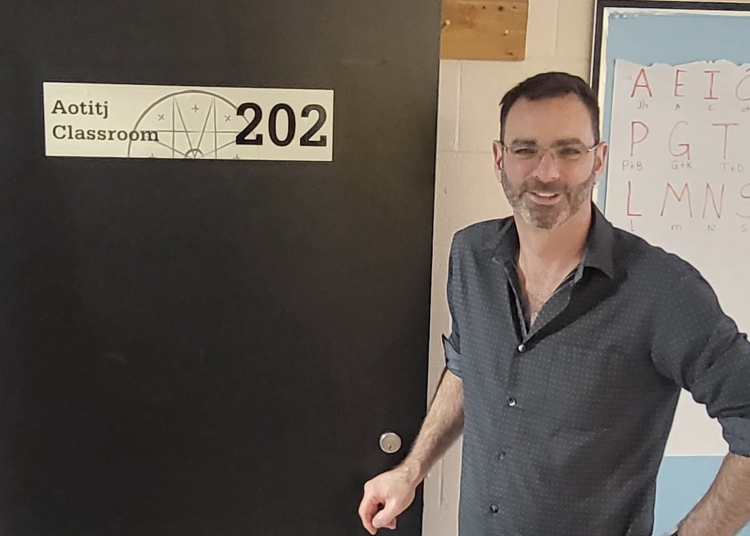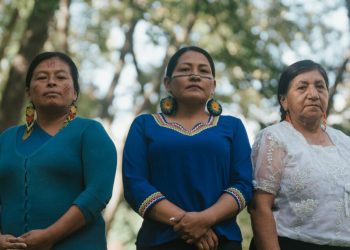The start of the school year is here, but a recent funding decision by Indigenous Services Canada (ISC) in the wake of Prime Minister Mark Carney’s sweeping call for budget cuts means that university students in the Aotiitj Program in Elsipogtog First Nation will return to class without the support they need for success.
A partnership between the Elsipogtog First Nation Education Authority and St. Thomas University, Aotiitj offers in-person university study in the community to local residents. The program is funded entirely by the First Nation (with in-kind support from STU) and also relies on money from a proposal-based fund overseen by ISC.
Aotiitj began in the early 2010s offering one year of STU courses. Since then, the program has grown and now offers two years of study toward a STU degree. Elsipogtog is at least one-hour drive from access to in-person university study, but Aotiitj brings the university to the community for people who otherwise would not or could not choose to pursue it. The program takes its name from the Mi’kmaw term for path or trail. And as that name suggests, Aotiitj strives to be a path to a future that otherwise may not be possible.
This year, Aotiitj is offering 25 courses taught by qualified STU professors in liberal arts disciplines as varied as social work, Mi’kmaw language, native studies, political science, sustainability, journalism, great books, and Spanish language.
All classes are in-person in a former first grade classroom in a community centre known locally as “The Old School.” There are currently eight part-time professors in the program (from both Indigenous and non-Indigenous backgrounds).
This year, Aotiitj is proud that 44 per cent of its courses will be delivered by professors who themselves are citizens of Elsipogtog. Student enrollment is also up over last year, with 22 new and returning students admitted to the program (though recent funding cuts have meant that not all will be able to attend).
Aotiitj is unique in the country, is growing, and is an exemplar of the goals of the federal program that it relies on.
The core cost of the program is the courses themselves, and these are funded by the community’s education authority. This arrangement means that STU does not collect tuition from students enrolled in the program. Historically, funding from the feds has augmented this core funding and is used to provide vital program supports that help to ensure student success. These include basics like rent on classroom space, program admin costs, and the salary of the program coordinator (currently yours truly). But proposal-based federal funding also facilitates the participation of community Elders and other Knowledge Keepers in the community to lead Ceremony and other nurturing and culturally relevant activities.
This proposal-based model also typically supports two annual student trips to STU’s main campus in Fredericton. These trips make the dream of a university education come alive for the students as they familiarize themselves with the university and engage in degree-planning. Crucially, however, these funds are used for extra tutorial hours, increasing subject matter-specific contact with profs, above and beyond regular class time.
Proposals for this funding are submitted annually to the feds in the spring and are adjudicated by a committee of First Nation education administrators and Indigenous Services Canada staff. Results are usually circulated in the early summer, and Aotiitj received its final results in mid-July.
For context, the proposal submitted to support Aotiitj in 2024-25 was for $278,000. The amount awarded was only $144,000. We were forced to make do with funds carried over from previous years.
But we’ve now depleted those reserves, so the proposal submitted for 2025-26 was for roughly the same amount — $277,000. Notably, the latest proposal made a specific request for funds to enhance student supports through a (part-time) dedicated mental health professional to address the acute needs of students in the program. Of the $277,000 requested, Aotiitj was awarded a mere $95,000.
This is a 34 per cent reduction in funding compared to the previous year, representing 66 per cent less than the amount requested.
The reason cited by ISC for this exceptional reduction: “the requests for funding this year […] far exceed the regional funding amount.”
Or put another way, cuts.
As a result, Aotiitj is unable to offer vital supports and has been forced to focus only on core programming — like keeping a roof over our heads and delivering university courses — at the expense of doing as much as possible to ensure student success. We have also made the difficult decision to cut a monthly cost-of-living stipend provided to full-time students enrolled in Aotiitj. Students are literally being forced to choose between a pathway to university and putting food on the table.
Let’s be clear. The post-secondary education needs of First Nation citizens is a federal responsibility. Restoring funding to 2024-25 levels is our immediate goal. But long-term, Aotiitj must move away from an unreliable and unpredictable proposal-based model and be provided stable and reliable federal funding.
What the Aotiitj program has accomplished is truly remarkable. We have a track record of success and are changing lives in the community we serve, including in the pages of this very publication. (NB Media Co-op staff reporter and editor David Gordon Koch has taught several journalism courses in the program, leading students to publish their original journalism with the Co-op). Our program has been able to grow under a proposal-based model, but this year’s results suggest that that pathway is no longer reliable — if it ever was.
In response to federal funding reductions, Mohawk Grand Chief Cody Diabo recently observed that “Canada cannot claim a commitment to reconciliation while cutting the very services that support [First Nation] communities.” Cuts to services based on race violate both the Charter of Rights and Freedoms and Canada’s constitutional obligation to First Nations. The previous government made significant strides toward reconciliation. The current government must not walk away from this.
Rob LeBlanc is a settler who teaches political science and native studies at St. Thomas University, and is the coordinator of the Aotiitj Program in Elsipogtog First Nation.


![Poster exhibit remembers the two Japanese cities devastated by nuclear weapons [video]](https://nbmediacoop.org/wp-content/uploads/2025/10/image0-3-350x250.jpeg)

![Comic-con coming to Elsipogtog following ‘whirlwind’ of organizing [video]](https://nbmediacoop.org/wp-content/uploads/2025/08/East-Coast-Comic-Expo-19-350x250.jpg)





